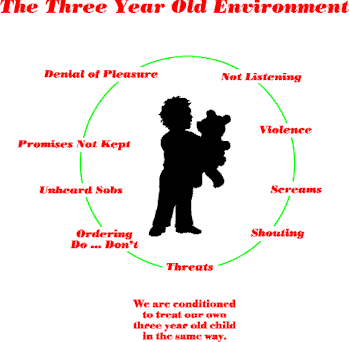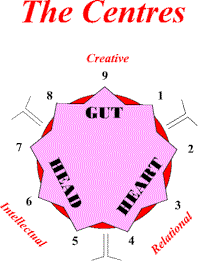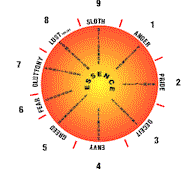Positive Health Online
Your Country

The Enneagram and Health: A tool for transformation
by Denise Coen and Jane Vukovic(more info)
listed in mind matters, originally published in issue 22 - September 1997
The Enneagram is a tool to uncover our compulsive life patterns. We create our own intimate world, by the thoughts we hold, the words we speak.
What we believe about ourselves, is true for us. The way we learn to feel about ourselves, and about our life as children was the reaction of adults to us and the adults around us.
'It was always my fault.'
'I could never do anything right.'
'How could you do that?'
'No-one ever heard a word I said.'
'I never heard "I love you"'.
Some experience self-hatred, hold resentment, criticism, guilt and fear, as well as 'I am not good enough' and 'I don't deserve . . .'

Figure 1
The past is gone, but our thoughts, attitudes and emotions about it are indelible.
Our compulsive life patterns are the manifestation of our experience, our inner thoughts, our programming.
"Theatre scripts written in childhood have a lasting effect on the adult mind." Alice Miller
The process of the Enneagram uncovers our compulsive life pattern so that we can claim where we 'sit' on the Enneagram circle.
You may well wonder how we got that pattern, which leads to distortion of our selves and becomes so powerful that it dominates our perception. We are born of essence of consciousness into an egocentric world where to survive we developed our personality.
The baby, totally dependent, needs to be nurtured by touch, warmth, nourishment, taste as well as smell, sight and love; but may be born into an atmosphere of noise, conflicting sounds where no one hears, no one comes and . . . are afraid.
To get attention the child develops a strategy, a signal, that works – by crying, wailing, not drinking, not sleeping – finding a way to bring comfort for survival.
This behaviour becomes a reactive habit to our environment for attention; the origin of our compulsion.
An addictive pattern means surrender of an aspect of one's self to something in order to survive.
From the moment of conception – in fact, even before that, according to A.T. Mann, an Astrologer – it begins with the thought of the prospective parents . . . and the thought of creating a new being . . . there is an intuitive awareness of the new being: an ethos develops into which we are born. Our mother's thoughts, experiences, traumas and shocks all impinge on us. The mother/father vibrations are the resonance to which we respond. An addiction is any desire that makes us unhappy or upset if not satisfied.
Our programming – positive and negative – was accepted by us as a three year old child. Our experience since then has been based upon what we accepted and believed about ourselves at that time.
As a three-year-old we learned to have power to control and manipulate people. We sensed we were good at it (see Figure 1). Our ego played a role based on pleasure, pain and fear, remembering our survival is paramount. Ego selects the replay programme and feelings are triggered: joy, pleasure, anger, grief, fear, disappointment. Emotional feeling-tones are either receiving, avoiding or giving.
Hurley and Dobson,[1,2] in their work on the Enneagram, stress the importance of the three centres of intelligence (see Figure 2). The Relational centre relates to the mammalian brain, processes emotions and is the seat of the ego. The Creative centre relates to the physical body and reptilian brain and understands the physical world.

Figure 2

Figure 3 The Enneagram enables movement towards Essence
The Intellectual centre, the neo-cortex, has the role of thinking or abstraction. Understanding these three aspects, it is obvious that all of these centres need to be aligned and integrated to begin to merge into wholeness.
The concept of human advancement has focused on sources outside the individual by scientists/politicians/society – "the all-knowing" – deciding what is best for the individual and the group.
They thought that external circumstances would bring internal changes and development to a higher level, eg. the industrial revolution and the health service. Today the power in our life still appears to be external circumstances to which we react/respond. In our personal life, we need to have the possibility to select a response – in fact to make a choice. The directive of all spiritual teachers from Hebrew, Sufi and early Christians is "Know Thyself".
We can work on this in various ways, whether by meditation, spiritual exercises, prayer or psychotherapy: any or all of these are helpful. However, the Enneagram goes further, uncovering our early strategy, which developed into a compulsion that can be identified as one of the nine personality types. Once identified, it is necessary that the individual claims this compulsion as an indicator of their personality type on the Enneagram circle.
The Enneagram demonstrates nine basic compulsions and the individual has one of these with which to work, to bring about the changes within his or her personality (see Figure 3). It is only through awareness that the individual will be able to slowly acknowledge this characteristic which has limited his potential. Looking at our life experience, we can identify through the Enneagram process recurring compulsive themes and patterns which link with our base centre. We are anchored to one of the three centres. The Gut centre relates to anger, the Heart centre relates to anxiety and the Head centre relates to fear. In order to change we need to look for – to search for – patterns in our life that work and the patterns in our life that do not. To catch a subtle thought and monitor it, knowing it may lead to our compulsion is the beginning of inner change and may initiate a transformation process.
Being born of consciousness, the compulsion became the personality and also a protector of our essence in order to survive in the critical and harsh world of reality. To become our true self, we know that we need to deal with the people in our world differently. So we can look at our work, our boss, our colleagues, our customers, our family, our friends, our relationships and our self-image as well as our health.
We realise that common to all areas of our life is our communication with ourselves and others.
This is the challenge: it is not easy, resistance to change in the form of fear, resentment, anxiety, anger, unworthiness and lack of self-worth all inhibit our intention to change to enable us to manifest our true self that has been hidden.
The Enneagram shows us the way to become the witness of our compulsive behaviour patterns and demonstrates how we can move from stress to safety and feel comfortable with the change, by learning to make choices in the here and now.
References
1. What's My Type: The Enneagram System of 9 Personality Types, Hurley & Dobson. Harper, San Fransisco, 1992.
2. My Best Self: Using Enneagram to Free the Soul, Hurley & Dobson. Harper, San Fransisco, 1992.
Comments:
-
No Article Comments available